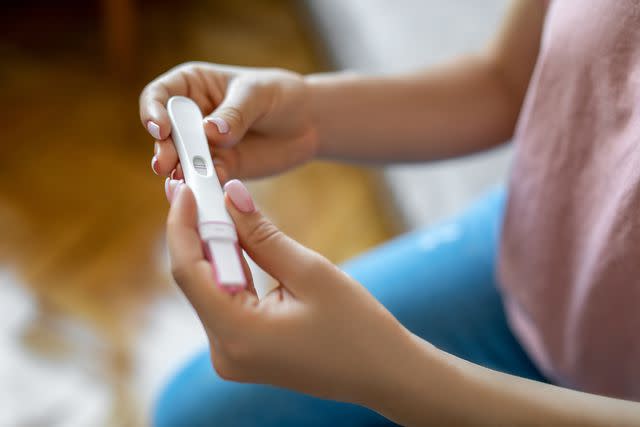What Causes Blood Clots in Early Pregnancy?
Causes of clotted bleeding in the first trimester, with or without pain
Medically reviewed by Peter Weiss, MD
Though bleeding during the first trimester of pregnancy may seem alarming, some light spotting or small blood clotting during this time is relatively common.
However, larger blood clots, small masses that form when the platelets, proteins, and cells in your plasma clump together and cause pain during early pregnancy, may signify another issue.
This article discusses early pregnancy blood clotting causes, what clotted bleeding looks like, and when to call a healthcare provider.

bymuratdeniz / Getty Images
Causes of Blood Clots in Early Pregnancy Without Pain
If you pass blood clots vaginally during early pregnancy and are not experiencing any other painful or unusual symptoms, it may be due to causes such as:
Implantation bleeding: Light bleeding or clotting can happen around two weeks after fertilization. This occurs when the fertilized egg implants itself into the uterine lining.
Cervical changes: In some cases, the cervix can bleed or pass blood clots more easily during early pregnancy, thanks to additional blood vessel development in this part of the body.
Other external factors: It's not unusual to experience light bleeding and clotting in early pregnancy after certain circumstances, like sexual intercourse, a Pap smear, or a pelvic exam.
Takeaway
Light bleeding during early pregnancy can result from several causes, some of which may or may not be concerning. Spotting or occasional small clots at this pregnancy stage are not a cause for alarm. Still, experts recommend contacting a healthcare provider or obstetrician-gynecologist (OB-GYN) if you notice bleeding or blood clotting during pregnancy.
Causes of Blood Clots in Early Pregnancy With Pain
Noticing clotted bleeding during early pregnancy and painful or uncomfortable cramping may signify something more serious. Potential causes include:
Miscarriage is when the pregnancy is no longer viable. In addition to bleeding or blood clotting, painful cramping may also occur. This requires immediate medical care.
Ectopic pregnancy is when a fertilized egg implants in a location outside of the uterus. Internal bleeding occurs, which can result in blood clotting. It's possible to experience abdominal, pelvic, or shoulder pain, blood, and potential clots. Seek immediate medical care.
Molar pregnancy is when a fertilized egg that's not viable develops into a small mass or tumor instead of a fetus. Symptoms include vaginal bleeding, pelvic pain, and more.
An infection, whether it's a sexually transmitted infection (STI) or a cervical or vaginal infection, can cause clotted bleeding during early pregnancy.
Passing Blood Clots vs. Light Bleeding in the First Trimester
Light bleeding or spotting (which is when you bleed just a few drops of blood) is common during early pregnancy. It's estimated that 15–25 out of every 100 pregnancies will experience bleeding during the first trimester.
This type of early pregnancy bleeding is often described as a brown, red, or pink discharge that may have a "gummy" texture due to the mixing of dried blood and cervical mucus.
Vaginal blood clots may look like a dark, red, jelly-like blob of blood. Clots may also be thick or stringy. An average blood clot is roughly the size of a dime, though these dimensions can vary slightly. A clot larger than a quarter in diameter may signal an underlying issue.
Can Pregnancy Endure if You're Passing Blood Clots?
Bleeding and blood clotting during early pregnancy do not automatically mean there's an issue or that the pregnancy won't endure.
That said, it's possible that passing blood clots could be signs of a miscarriage or a loss of pregnancy during the first 13 weeks. This is estimated to happen with about 10 in every 100 known pregnancies.
Checking with a healthcare provider to determine the cause of the clotting and the health of the pregnancy is best.
Takeaway
Experiencing early pregnancy loss can be extremely difficult. For support while coping with the grief of a miscarriage, consider speaking with a healthcare provider or OB-GYN for a recommendation to a counselor or other mental healthcare professional. Experts recommend online support groups to connect with others in the same situation.
How to Manage Blood Clots and Bleeding at This Pregnancy Stage
If you notice bleeding or blood clotting during early pregnancy, check with a healthcare provider first. Be prepared to answer questions about:
How heavy the bleeding and/or clotting is
How often it's occurring
The size of the blood clots
The color of the clots and the blood
Management will depend on the underlying cause. If the pregnancy remains healthy, a healthcare provider may recommend resting and temporarily avoiding activities like sex, tampons, or douching to reduce bleeding and clotting.
Call a Provider for Heavy Bleeding
Heavy bleeding or excessive blood clotting should be examined by a healthcare provider or the emergency room as soon as possible. Some of the other signs that you should seek immediate medical attention include:
Pain
A gush of vaginal fluid, even if it's not blood
The passing of tissue or larger clots from the vagina
Tests, such as an ultrasound, blood test, urine test, or pelvic exam, may determine the cause of the bleeding and the status of the pregnancy.
Takeaway
Miscarriage during early pregnancy is almost always due to uncontrollable factors. Experts underscore that factors such as exercise, stress, birth control pills, working, falling, or having sex do not cause miscarriage.
Research estimates that roughly half of miscarriages during early pregnancy occur when the embryo doesn't develop properly.
Summary
Experiencing some bleeding or blood clotting (a stringy clump or mass of blood from the vagina) during early pregnancy isn't always cause for alarm. Sometimes, implantation bleeding, cervical changes, infections, or other factors can lead to clotted bleeding. Check with a healthcare provider if you notice any unusual clotting or bleeding during the first trimester of pregnancy to diagnose its underlying cause.
Read the original article on Verywell Health.

